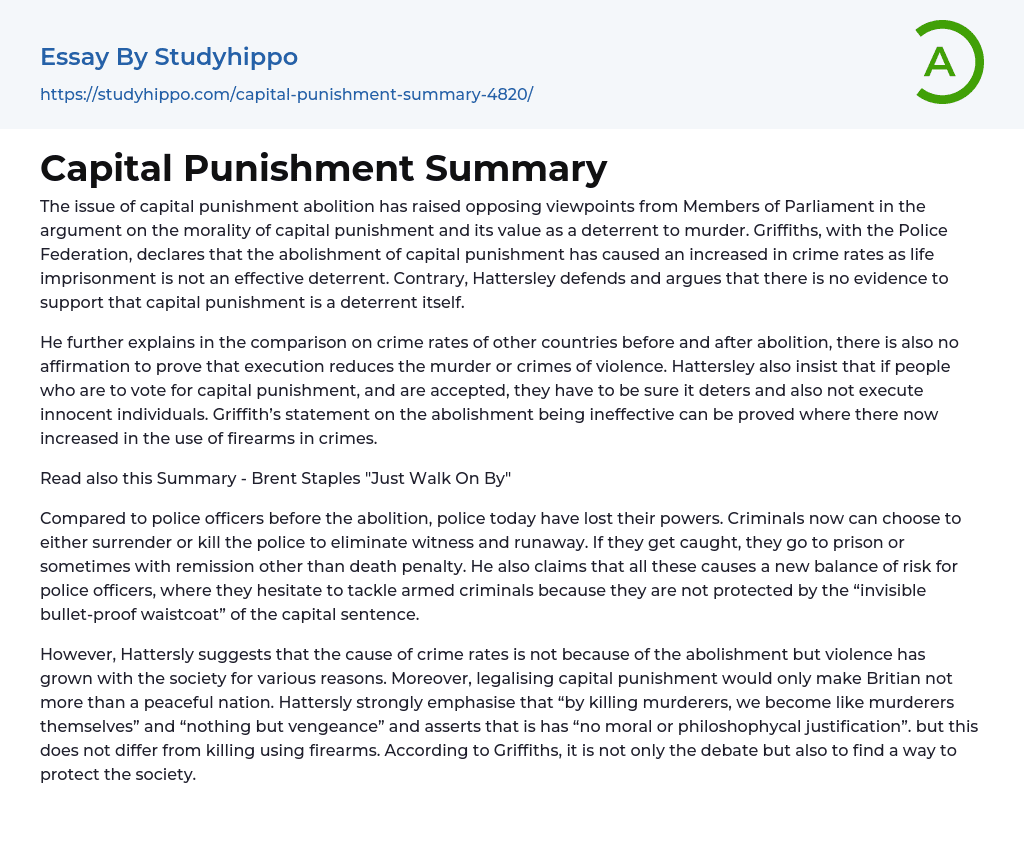The Members of Parliament have conflicting views on the ethical and practical implications of abolishing capital punishment as a means to prevent murder. Griffiths, who represents the Police Federation, contends that eliminating capital punishment has led to increased crime rates since life imprisonment is insufficient to discourage criminals. Conversely, Hattersley challenges this assertion by stating that there is no evidence substantiating the notion that capital punishment acts as a deterrent for crime.
Hattersley argues that the crime rates in other countries before and after abolition do not provide evidence for the reduction of murder or violent crimes through execution. He also highlights the importance of ensuring that those who support capital punishment are confident that it deters crime and does not lead to wrongful executions. Griffith's claim about the ineffectiveness of abolition can be illustrated
...by the rise in firearm usage in criminal activities.
The text discusses how the powers of police officers have diminished compared to the past. Criminals now have the option to surrender or kill the police in order to avoid being witnessed or captured. If caught, criminals may face imprisonment or alternative forms of punishment rather than the death penalty. This new dynamic creates a new level of risk for police officers, who hesitate to confront armed criminals because they lack the protection provided by capital punishment.
However, according to Hattersly, crime rates are not caused by the abolishment of capital punishment, but rather violence has increased in society for various reasons. Additionally, legalizing capital punishment would not make Britain a more peaceful nation. Hattersly strongly argues that by executing murderers, we become like murderers ourselves, and this act is nothing but revenge with
no moral or philosophical justification. However, killing using firearms is no different. Griffiths believes that the debate should not only focus on the issue itself but also on finding ways to protect society.
- Mass Incarceration essays
- Affirmative Action essays
- Assisted Suicide essays
- Capital Punishment essays
- Censorship essays
- Child Labour essays
- Child Protection essays
- Civil Rights essays
- Corporal Punishment essays
- Death Penalty essays
- Empowerment essays
- Euthanasia essays
- Gay Marriage essays
- Gun Control essays
- Human Trafficking essays
- Police Brutality essays
- Privacy essays
- Sex Trafficking essays
- Speech essays
- Animal Cruelty essays
- Charles Manson essays
- Crime Prevention essays
- Crime scene essays
- Criminal Justice essays
- Criminology essays
- Cyber Crime essays
- Damages essays
- Detention essays
- Distracted Driving essays
- Drug Trafficking essays
- Drunk Driving essays
- Forensic Science essays
- Gang essays
- Hate Crime essays
- Homicide essays
- Identity Theft essays
- Juvenile Crime essays
- Juvenile Delinquency essays
- Juvenile Justice System essays
- Law Enforcement essays
- Murder essays
- Organized Crime essays
- Penology essays
- Piracy essays
- Prison essays
- Property Crime essays
- Prostitution essays
- Punishment essays
- Punishments essays
- Rape essays




